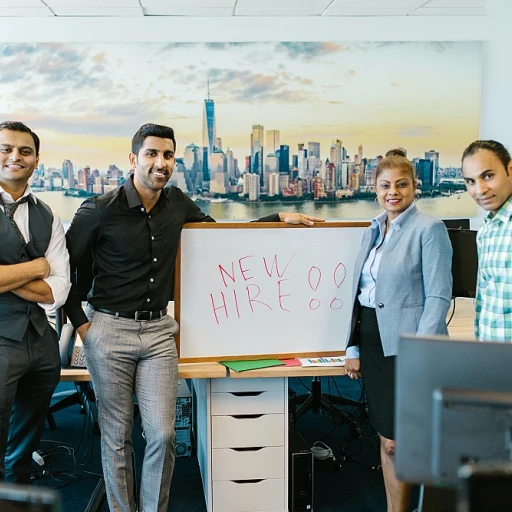
The Role of OCM in HR Innovation
Integrating Organizational Change Management into HR Innovation
Organizational Change Management (OCM) plays a pivotal role in driving innovation within Human Resources (HR). As businesses navigate an ever-evolving landscape, the need to adapt and embrace change becomes paramount. This is where OCM shines, facilitating smooth transitions and ensuring that both strategy and execution align effectively within the organization's framework. OCM in HR is not merely about implementing changes but ensuring those changes are sustainable and beneficial in the long term. The integration of OCM involves dealing with the complexities of change initiatives and making sure they resonate with the company’s vision. Essentially, OCM is the bridge between the organizational change strategy and its successful implementation, guiding businesses through transformational changes. The success of any HR innovation heavily relies on effective OCM strategies that prioritize communication and leadership. Good OCM involves understanding the underlying systems and processes that support the organization’s goals and aligning them with the desired changes. The emphasis is on a collaborative approach, engaging team members and employees at every stage of the change process to foster acceptance and readiness. In practice, this means employing project management skills to design, implement, and manage the change process. OCM requires a keen understanding of the business landscape, allowing HR leaders to manage changes efficiently and effectively. This also involves preparing the workforce through proper training and support, ensuring that they are equipped to embrace new processes and technologies. One critical aspect of successful OCM implementation is engaging the right people to spearhead the efforts. The role of a change agent in HR innovation cannot be overstated. These individuals act as catalysts, driving organizational changes by inspiring, motivating, and guiding teams through the transition. Explore more on the role of a change agent in HR innovation. As HR continues to evolve, the integration of OCM becomes increasingly important. With the rapid pace of digital transformation and evolving workforce dynamics, companies must leverage effective OCM to ensure their employees and systems are geared for success. This strategic alignment is key to facilitating seamless organizational changes, ultimately leading to a more resilient and innovative HR function.Key Components of Effective OCM
The Fundamental Aspects of Managing Change
To drive successful innovation within human resources, understanding the essential components of effective organizational change management (OCM) is crucial. Implementing these components not only ensures smoother transitions but also fosters a culture where change is embraced rather than resisted.Strong Leadership at the Helm
Every transformational change needs a robust leadership team that can provide direction and motivate employees towards a common goal. Leaders should be visible champions of change, reinforcing the vision and aligning the organization's strategy with the project management efforts. Effective leadership also involves preparing and empowering employees, thereby ensuring their engagement in the OCM process.Clear and Consistent Communication
Communication is the bedrock of managing changes within an organization. Establishing a transparent communication strategy helps in setting expectations, clarifying the purpose of change, and addressing any concerns. Open channels of communication also provide employees with avenues to give feedback, which can be instrumental in refining the strategy as needed.A Structured Approach to Change
Developing a structured approach ensures that the organizational change process is methodical and systematic. This involves creating detailed project plans that outline the timelines, resources, and responsibilities necessary for the successful implementation of the desired changes. A structured approach minimizes disruption by aligning business processes with strategic objectives.Employee Training and Support Systems
Equipping teams with the necessary skills and knowledge is pivotal for an effective OCM strategy. Implementing comprehensive training programs prepares employees to adapt well to new systems and processes. Additionally, establishing robust support mechanisms, such as helpdesks or mentorship, can assist in managing resistance and facilitate a smooth transition.Monitoring and Feedback Mechanisms
Continuous monitoring and feedback are crucial in assessing the effectiveness of the change initiatives. By establishing key performance indicators (KPIs), organizations can track progress and make informed decisions about any adjustments needed in the OCM implementation. This not only helps in achieving short-term goals but also supports long-term business success. To delve deeper into the critical role of change agents in facilitating these processes, you can explore this comprehensive guide on understanding change agents in HR. Embarking on these pillars ensures your company is well-positioned to navigate the complex landscape of change and transformation effectively.Challenges in Implementing OCM
Overcoming Obstacles to Propel HR Innovation
Implementing organizational change management (OCM) in the context of human resources innovation presents a unique set of challenges that must be carefully navigated to ensure success. These challenges often stem from a myriad of factors that can affect the overall success of a change initiative. Understanding and addressing these obstacles are crucial for leaders and teams aiming to foster transformational changes within their organizations. One of the most prevalent challenges in OCM implementation is resistance to change. Employees and teams may feel threatened by the introduction of new processes or technologies, which can lead to pushback and hinder the progress of change initiatives. Building a strong foundation of trust and ensuring open lines of communication can help mitigate resistance, fostering a more collaborative and supportive environment for change. Another challenge is maintaining alignment between the organizational strategy and the OCM strategy. As companies undergo digital transformation and other significant changes, it’s essential to ensure that the OCM efforts are strategically aligned with the broader business goals. This alignment is crucial for ensuring that the changes implemented are sustainable and contribute to the company's long-term success. Training and preparing the workforce for new processes and systems also pose significant challenges. Effective OCM requires comprehensive training programs that not only educate employees on new systems but also help them develop the skills needed for managing change. Providing adequate support and resources can facilitate smoother transitions and enhance the organization's adaptability to change. Leadership is another critical factor in overcoming change-related challenges. Leaders must not only champion the change initiatives but also be actively involved in the change process. Their engagement serves as a model for the rest of the organization, reinforcing the importance of the change and inspiring confidence among employees. Moreover, managing the complexity of change management processes can overwhelm organizations if not approached methodically. A well-structured project management framework can assist in organizing and prioritizing tasks, ensuring that each phase of the change implementation is systematically executed. The importance of managing change effectively cannot be understated, especially in sectors like life sciences and those undergoing rapid digital transformation. For organizations looking to enhance their change management strategies, exploring how agile HR is shaping the future of work can offer valuable insights into innovative approaches that drive successful change initiatives.Case Studies: Successful OCM in HR
Real-World Success Stories in Introducing Change
The world of organizational change management (OCM) in HR is not just about theories; it’s about implementing practical solutions that work. Let's look into some inspiring case studies where effective OCM strategies have driven meaningful transformation within organizations.Transforming Business Culture Through Strategic Change
One notable success story is of a company in the life sciences sector. Faced with growing competition and a need for digital transformation, this organization undertook a comprehensive change management project. They focused on redefining their company culture by implementing an OCM strategy that emphasized open communication and continuous feedback.- Leadership Commitment: The leadership team played a crucial role by actively supporting the change process. They took the lead in communicating the vision and goals of the change, fostering trust and transparency among the employees.
- Employee Involvement: Employees were encouraged to participate in the change process. Regular workshops and training sessions were organized to equip them with the necessary skills and knowledge.
- Consistent Support System: A robust support system was established to address concerns and queries promptly, ensuring a smooth change implementation.
Enhancing HR Processes in a Global Enterprise
Another remarkable example is a global company's endeavor to overhaul their HR processes. With a diverse workforce spread across multiple regions, the organization faced challenges in harmonizing their HR functions.- Strategic OCM Implementation: The organization adopted a strategic OCM implementation approach, focusing on streamlining their systems processes. This included integrating a digital HR platform to standardize processes across all locations.
- Cross-functional Teams: They formed cross-functional teams involving HR professionals, IT experts, and line managers to work collaboratively on the project.
- Targeted Training Programs: Comprehensive training programs were designed to enhance the skills of HR professionals and help them adapt to new systems and processes.
Impactful Strategies in Organizational Change
These case studies illustrate that successful OCM requires more than just a well-planned strategy; it needs effective leadership, active employee involvement, and a dedicated support system. By focusing on these key components, organizations can navigate the complex landscape of change and achieve long-term success in their transformational changes.Tools and Technologies Supporting OCM
Technological Aids in Modern Change Initiatives
In the realm of successful organizational change management, various tools and technologies play an integral role in fostering innovation and managing the complexities associated with change. Technology has become a significant ally in driving smooth transitions within organizations, enhancing the overall effectiveness of OCM strategies.
One of the foremost tools supporting OCM is digital platforms that facilitate communication and collaboration among team members. These platforms ensure that information flows seamlessly across different departments, minimizing miscommunication and fostering a culture of transparency.
Moreover, project management software provides organizations with a systematic approach to tracking progress and managing tasks. By streamlining processes, these tools help identify potential bottlenecks early, allowing for timely interventions and adjustments in strategy.
Employee training tools are also indispensable in an OCM arsenal. They ensure that staff members are well-equipped to adapt to new systems and processes, ultimately paving the way for a smoother transition. Training programs can be tailor-made to align with specific organizational goals, ensuring that employees are not only informed but also motivated to embrace change.
Furthermore, analytics tools provide valuable insights into the impact of change initiatives, offering data-driven perspectives that facilitate informed decision-making. By harnessing these insights, leaders can refine their change management strategies and enhance their alignment with organizational objectives.
As we look towards the future, the integration of emerging technologies such as AI and machine learning in OCM processes promises to further revolutionize the field. These advancements will likely contribute to more personalized and adaptive change management strategies, tailored to meet the unique needs of each organization.
Future Trends in OCM and HR Innovation
Embracing the Future of OCM and HR Innovation
The landscape of organizational change management within human resources is ever-evolving, and several future trends are emerging that promise to shape the way businesses manage change moving forward. As companies continue to grapple with the fast-paced nature of change, strategies and tools that prioritize people-centric approaches will become even more critical.
One significant trend is the ongoing shift towards digital transformation. Organizations are increasingly investing in technology to drive seamless change implementation, making digital tools an integral part of their change management strategy. This move not only enhances process efficiency but also aligns with organizational changes by creating a more agile change management infrastructure.
Additionally, the importance of leadership in managing change cannot be overstated. Future change management strategies will rely heavily on strong leadership and effective communication to guide employees through transformational changes. Leadership teams will need to employ strategic management approaches to foster buy-in and reduce resistance to change among their workforce.
Another key aspect is the integration of hybrid work models. As remote work becomes a staple, organizations must adapt their OCM implementation to accommodate diverse work environments. This includes the development of training programs and support systems that ensure all team members, regardless of location, can effectively contribute to and navigate the changing organizational processes.
Lastly, a focus on data-driven decisions will be paramount. Companies will increasingly turn to analytics and data insights to measure the success of their OCM initiatives, allowing for more precise adjustments to strategies and ensuring long-term success. This data-centric approach will also help organizations pinpoint which areas require additional support and training, ensuring that all employees are equipped to handle ongoing changes.
As OCM continues to evolve, businesses must stay ahead of these trends to successfully lead and manage organizational changes, making the process less daunting and more structured for everyone involved.













